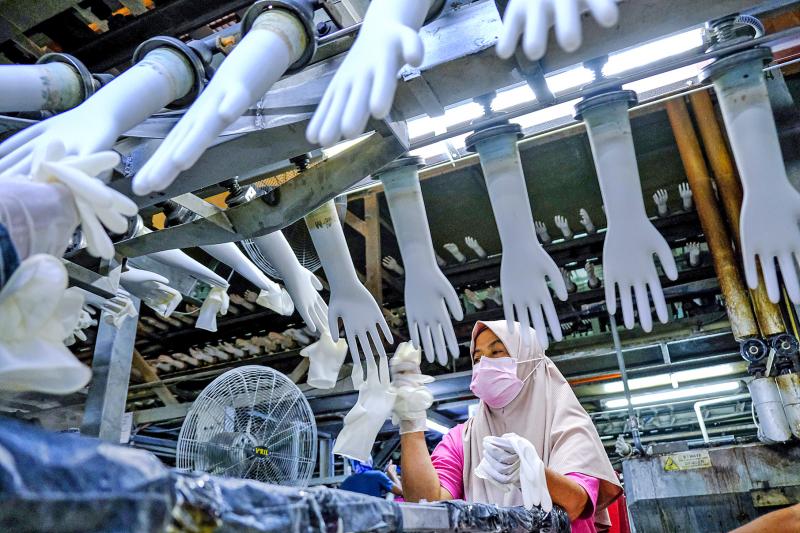Asia’s factories did a better job in the past month than their European counterparts of weathering the supply chain effects of China’s lockdowns and the conflict in Ukraine.
South Korea’s purchasing managers’ index (PMI) climbed to 52.1 last month, recovering some ground lost in March, S&P Global said.
The Philippines, Myanmar and Australia all advanced as well, while only Taiwan proved an outlier.

Photo: Bloomberg
By contrast, the equivalent measure in the eurozone was at a 15-month low.
“It will be important to see how growth momentum is sustained amid ongoing supply chain disruption and sharply rising costs,” S&P Global economist Maryam Baluch said.
China remains a significant risk as the latest surge in COVID-19 cases and subsequent lockdowns threaten to choke off manufacturing logistics and restrain trade.
In the eurozone, a measure of factory activity was revised up slightly to 55.5, but still confirmed to be slowing as shortages of components were aggravated by the Chinese outbreak and the war in Ukraine. Rising prices and uncertainty about the economic outlook also weighed on demand in the currency bloc, with growth in new orders slowing sharply.
The region’s manufacturing sector “looks set for a difficult period of falling production and surging prices,” S&P Global economist Chris Williamson said.
Asia-Pacific economies, which include some of the world’s top exporters, largely held up last month. Weaker activity in China — the top trading partner for much of the region — was offset by renewed demand in other key markets such as the US.
The Philippines recorded its best performance since November 2017, as output and new orders surged.
Taiwan fell — reflecting its deep economic links to China — with its lowest reading since July 2020.
In South Korea, price and supply pressures were exacerbated by Russia’s war on Ukraine and China’s expanding COVID-19 restrictions.
The fallout from China’s pandemic measures was evident in the nation’s manufacturing data, with a gauge of factory activity last month plunging to its lowest level in more than two years, data released over the weekend showed.
Last month’s PMI releases are scattered across several days because of holidays across the region, including Eid al-Fitr in Southeast Asia’s largest economy, Indonesia. Thailand’s PMI is set for release today, with Vietnam and Indonesia following tomorrow and Malaysia’s on Thursday.

SEEKING CLARITY: Washington should not adopt measures that create uncertainties for ‘existing semiconductor investments,’ TSMC said referring to its US$165 billion in the US Taiwan Semiconductor Manufacturing Co (TSMC, 台積電) told the US that any future tariffs on Taiwanese semiconductors could reduce demand for chips and derail its pledge to increase its investment in Arizona. “New import restrictions could jeopardize current US leadership in the competitive technology industry and create uncertainties for many committed semiconductor capital projects in the US, including TSMC Arizona’s significant investment plan in Phoenix,” the chipmaker wrote in a letter to the US Department of Commerce. TSMC issued the warning in response to a solicitation for comments by the department on a possible tariff on semiconductor imports by US President Donald Trump’s

The government has launched a three-pronged strategy to attract local and international talent, aiming to position Taiwan as a new global hub following Nvidia Corp’s announcement that it has chosen Taipei as the site of its Taiwan headquarters. Nvidia cofounder and CEO Jensen Huang (黃仁勳) on Monday last week announced during his keynote speech at the Computex trade show in Taipei that the Nvidia Constellation, the company’s planned Taiwan headquarters, would be located in the Beitou-Shilin Technology Park (北投士林科技園區) in Taipei. Huang’s decision to establish a base in Taiwan is “primarily due to Taiwan’s talent pool and its strength in the semiconductor

An earnings report from semiconductor giant and artificial intelligence (AI) bellwether Nvidia Corp takes center stage for Wall Street this week, as stocks hit a speed bump of worries over US federal deficits driving up Treasury yields. US equities pulled back last week after a torrid rally, as investors turned their attention to tax and spending legislation poised to swell the US government’s US$36 trillion in debt. Long-dated US Treasury yields rose amid the fiscal worries, with the 30-year yield topping 5 percent and hitting its highest level since late 2023. Stocks were dealt another blow on Friday when US President Donald

UNCERTAINTY: Investors remain worried that trade negotiations with Washington could go poorly, given Trump’s inconsistency on tariffs in his second term, experts said The consumer confidence index this month fell for a ninth consecutive month to its lowest level in 13 months, as global trade uncertainties and tariff risks cloud Taiwan’s economic outlook, a survey released yesterday by National Central University found. The biggest decline came from the timing for stock investments, which plunged 11.82 points to 26.82, underscoring bleak investor confidence, it said. “Although the TAIEX reclaimed the 21,000-point mark after the US and China agreed to bury the hatchet for 90 days, investors remain worried that the situation would turn sour later,” said Dachrahn Wu (吳大任), director of the university’s Research Center for